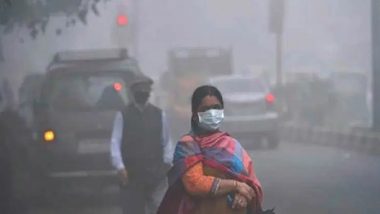New Delhi, October 14: The Delhi Pollution Control Committee (DPCC) on Wednesday issued directions banning the use of diesel generators in the national capital from Thursday under the Graded Response Action Plan (GRAP)
GRAP is a set of anti-pollution measures that come into force in Delhi and its vicinity towns according to the severity of the situation. It was notified by the Ministry of Environment and Forests in 2017 for implementation through the Supreme Court-mandated Environment Pollution (Prevention and Control) Authority. Delhi Air Pollution: Air Quality in National Capital Remains in ‘Poor’ Category for 8th Consecutive Day With Rise of Pollutants in Atmosphere.
"DPCC hereby bans the operation of generator sets of all capacities, run on diesel, petrol or kerosene in Delhi with effect from October 15 till further orders, excluding those used for essential or emergency services," an official order read.
Essential services include healthcare facilities, elevators, railway services, Delhi Metro, airports and interstate bus terminals and the data centre run by the National Informatics Centre.
The measures under GRAP, which was first implemented in Delhi-NCR in 2017, include increasing bus and metro services, hiking parking fees and stopping use of diesel generator sets when the air quality turns poor.
When the situation turns "severe", GRAP recommends closure of brick kilns, stone crushers and hot mix plants, sprinkling of water, frequent mechanised cleaning of roads and maximising power generation from natural gas. The measures to be followed in the "emergency" situation include stopping entry of trucks in Delhi, ban on construction activities and introduction of the odd-even car rationing scheme. Delhi Air Pollution: Air Quality in National Capital Remains in ‘Poor’ Category for 6th Consecutive Day, Likely to Improve Slightly in Coming Days.
EPCA, however, had earlier told Delhi, Haryana, Rajasthan and Uttar Pradesh that they "should try and avert the need to take other emergency measures for pollution control as the economy is already under stress post lockdown. Therefore, our combined effort is to ensure that there is no further disruption".













 Quickly
Quickly


